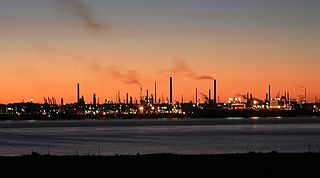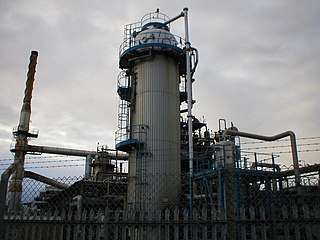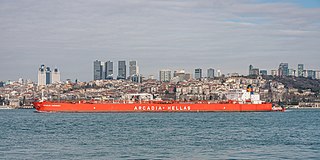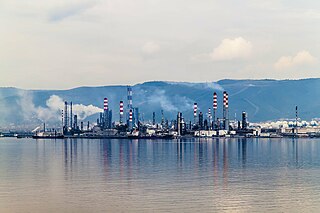
Batman is a city and capital of Batman District in Batman Province, Turkey. It lies on a plateau, 540 meters above sea level, near the confluence of the Batman River and the Tigris and had a population of 452,157 in 2021. It is populated by Kurds.
Koç Holding A.Ş. is the largest industrial conglomerate in Turkey, and the only company in the country to be listed on the Fortune Global 500 as of 2023. The company, headquartered in Nakkaştepe, Istanbul, is controlled by the Koç family, one of Turkey's wealthiest families.

Stanlow Refinery is an oil refinery owned by Essar Energy in Ellesmere Port, North West England. Until 2011, it was owned by Shell UK. The refinery is situated on the south bank of the Manchester Ship Canal, which is used to transport seaborne oil for refining and chemicals for Essar.
The Vadinar refinery is an oil refinery at Vadinar, Gujarat, India. It is owned and operated by Nayara Energy Limited, in which Rosneft owns a 49.13% stake. The refinery is India's second largest single-location refinery, with an annual capacity of 20 million tonnes and a complexity of 11.8, which also makes it among the world's most complex refineries.

Coryton Refinery was an oil refinery in Essex, England, on the estuary of the River Thames 28 miles (45 km) from central London, between Shell Haven Creek and Hole Haven Creek, which separates Canvey Island from the mainland.

Shell Haven was a port on the north bank of the Thames Estuary at the eastern end of Thurrock, Essex, England and then an oil refinery. The refinery closed in 1999 and the site was purchased by DP World who received planning consent in May 2007 for the new London Gateway deep water container port at the site. The neighbouring Coryton Refinery remained in operation until 2012.

Fawley Refinery is an oil refinery located at Fawley, Hampshire, England. The refinery is owned by Esso Petroleum Company Limited, a subsidiary of Exxon Mobil Corporation, which acquired the site in 1925. Situated on Southampton Water, it was rebuilt and extended in 1951 and is now the largest oil refinery in the United Kingdom, and one of the most complex refineries in Europe. With a capacity of 270,000 barrels (43,000 m3) per day, Fawley provides 20 per cent of the UK's refinery capacity. Over 2,500 people are employed at the site.

Grangemouth Refinery is an oil refinery complex located on the Firth of Forth in Grangemouth, Scotland, currently operated by Petroineos. It is the only operating crude oil refinery in Scotland and currently one of the six remaining refineries in the UK. Grangemouth is the oldest refinery in the UK and supplies 65% of Scotland's oil products, including petrol and diesel.

The BPRefinery (Kent) was an oil refinery on the Isle of Grain in Kent. It was commissioned in 1953 and had a maximum processing capacity of 11 million tonnes of crude oil per year. It was decommissioned in August 1982.

Eastham Oil Terminal is situated close to the small town of Eastham on the Wirral Peninsula, beside the Manchester Ship Canal. It was commissioned in 1954 close to the Queen Elizabeth II Dock and is a storage and export facility for oil products refined at Stanlow Refinery, to which it is connected by pipeline. The site is currently operated by Nynas.
ATAŞ, short for "Anadolu Tasfiyehanesi Anonim Şirketi", is a former oil refinery company in Mersin, southern Turkey. Currently, The facility is used as an oil storage and terminal.
Tüpraş Kırıkkale Oil Refinery is an oil refinery in Kırıkkale, central Turkey. It is owned and operated by Tüpraş, the country's only oil refiner with four refineries.
Tüpraş Izmir Oil Refinery is an oil refinery in Izmir, western Turkey. It is owned and operated by Tüpraş, the country's only oil refiner with four refineries.
Tüpraş Batman Oil Refinery is an oil refinery in Batman, southeastern Turkey. It is owned and operated by Tüpraş, the country's only oil refiner with four refineries.

Ceyhan–Kırıkkale Oil Pipeline, also known as Yumurtalık (Ceyhan)–Kırıkkale Oil Pipeline is a crude oil pipeline between Ceyhan and Kırıkkale in Turkey. It is owned and operated by the state-owned company Botaş.

Mehmet Ömer Koç is a Turkish businessman, art collector, and chairman of Koç Holding. In 2013 Forbes estimated his net worth at US$1.1 billion.
Heysham oil refinery was located between Heysham and Middleton on the Heysham peninsula, Lancashire. It was built during the Second World War to produce high octane fuel for combat aircraft. It was later adapted to refine crude oil with a processing capacity of two million tonnes per year and was in operation from 1948 to 1976. It worked in conjunction with a chemical plant which produced ammonium nitrate fertilizer and other products, using feedstocks from the refinery.

Oil supplies over a quarter of Turkey's energy. Because the country produces very little oil, it is almost completely dependent on imports of oil and oil products such as petrol and diesel, over half of which is consumed in the country's road vehicles. Turkey is the world's largest user of liquefied petroleum gas (LPG) for road transport.

Tüpraş Izmit Oil Refinery is an oil refinery in Izmit, western Turkey. It is owned and operated by Tüpraş. Amongst others it refines Urals crude. Its capacity is slightly less than that of Tüpraş Izmir. It produces diesel fuel. Climate Trace estimates that in 2022 it emitted almost 3 million tonnes of greenhouse gas.












